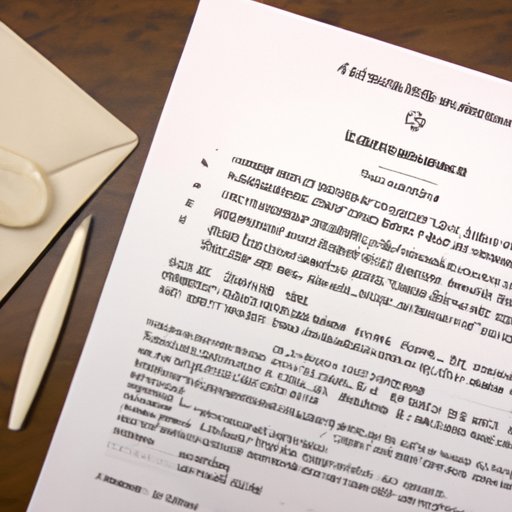
Introduction
Communication between a judge and someone who is not a lawyer usually happens through letters, whether as a request for court service, a letter of recommendation, or a complaint. Addressing a judge in a letter is different from addressing any other person, and it’s important to do so correctly to show respect for both the court and the judge. In this article, we will provide a guide on how to address a judge in a letter, outlining the proper etiquette and format to follow.
Proper Etiquette: How to Address a Judge in a Letter
When drafting a letter to a judge, it’s important to ensure that the letter is polished and professional. This includes using the correct title and form of address for the judge. All correspondence should begin with the title, “The Honorable [Full Name],” followed by the body of the letter. It’s also important to avoid using nicknames or informal names while addressing the judge.
If you are not sure about the judge’s full name, you can check the court’s website or do a quick internet search. Always ensure that the name is correct to avoid any misunderstandings or delays in your communication.
Judicial Correspondence: The Dos and Don’ts of Addressing a Judge
When writing to a judge, it’s essential to maintain proper etiquette and formality. Always use proper grammar and punctuation, avoid slang and abbreviations, and be concise and clear in your message. It’s important to express your thoughts and ideas in a clear, organized manner to ensure that the judge understands your message.
It’s crucial to ensure that you do not include any irrelevant information in your letter. This will show a lack of respect for the court’s time. Focus on the subject matter, stick to the point, and use professional language.
Remember to be cordial and respectful in your tone, as this will create a good first impression. Address the judge with a formal title and be polite throughout the letter.
A Guide to Addressing Judges in Formal Letters and Correspondence
In some situations, you may need to address a letter to a judge in a more formal manner, such as when writing a letter of recommendation or a petition. Here are several common scenarios along with tips on how to address judges in each situation:
Letters of Recommendation
When writing a letter of recommendation to a judge, it’s essential to follow proper etiquette. Start by stating your name, profession, and relationship with the person you’re recommending. Next, address the judge with “The Honorable [Full Name],” followed by the body of the letter. Use the same level of formality that you would use in any other professional correspondence.
Petitions
When writing a petition, the format should include the following parts:
- The heading, which includes the name of the petitioner and the name of the respondent.
- The body, which describes the alleged misconduct or incident.
- The prayer, which is what you want the court to do.
- The verification, where the petitioner signs the document and attests to its truth and correctness.
When addressing a judge in a petition, start with “The Honorable [Full Name].” Remember to be concise and clear in your message.
Respectful Communication: Tips for Addressing a Judge in Writing
The most important thing to remember when writing to a judge is to be respectful. Communicate your message in clear, concise language, and be honest. It’s important to use professional language and avoid slang or idioms that may be misinterpreted.
Address the judge with the proper title and be sure to proofread your letter before sending it. Make sure your message is clear, brief, and to the point. Keep in mind that the judge receives many letters every day, so your letter should be easy to read and understand.
Addressing a Judge: Best Practices for Writing Letters to the Court
Summing up, when addressing a judge in a letter, the most important thing is to show respect and professionalism at all times. Start your letter with “The Honorable [Full Name],” adhere to proper grammar and punctuation, avoid informal language, and keep your message concise and to the point.
Remember to proofread your letter before sending it, and always double-check the name and address of the judge you are writing to. By following these simple guidelines, you will help ensure your letter is well-received and that the judge has a positive impression of you.
Conclusion
Writing a letter to a judge requires proper etiquette and format, which help to show the utmost respect for the court and the judge. Remember to use professional language and avoid any informal remarks or derogatory language.
By following the guidelines outlined in this article, you will achieve a polished and professional communication style that will be well-received by the court. Take your time to craft a letter that is clear, concise, and to the point, and you will increase your chances of getting a favorable result in your case.




